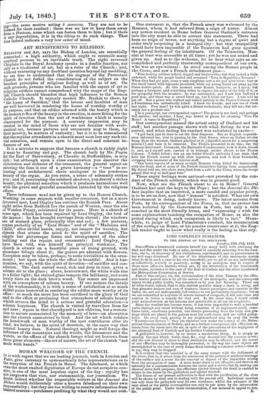ROMAN WELCOME OF THE FRENCH.
IT is with regret that we see leading journals, both in London and Pam, give currency to systematically false representations as to the reception of the French in Rome. The falsehood, at which even the most exalted dignitaries of Europe do not scruple to con- nive, is one of the most hopeless signs of the day : royalty has not outgrown that vice, nor statemansbip, nor journalism. We doubt indeed whether the respectable writers in the Journal des Debats would deliberately utter a known falsehood on their own responsibility ; but they are too willing to receive information from tainted aourcea--perehanee profiting by what they would not coin. One statement is, that the French army was welcomed by the Romans, whom it had relieved from a reign of terror. Almost any person resident in Rome before General Oudinot's entrance into the city must be able to correct this statement. There had been no reign of terror, nor anything but a degree of quiet and order truly surprising in a besieged city : but that tranquillity would have been impossible if the Triumvirs had gone against the general feeling of the inhabitants. Of the Triumvirs, Maz- zini at least was accessible at all times ; yet he was not seized and given up. And as to the welcome, let us hear what says an ac- complished and perfectly trustworthy correspondent of our own, who was an eye-witness : he stood among the Roman people in the Corso, and saw a French detachment pass— "Fine-looking soldiers indeed, dogged and businesslike; but they looked a little awkward, while the people hooted and screamed Viva la Repubblica Romano! ' When they had got past, some young simpleton sent a tin pail after them: four or live faced round with bayonets presented, while my young friend cut away up the Corso double-quick. At this moment some Roman bourgeois, as I fancy, but perhaps a foreigner, said something either to express his sense of the folly of it, or his sympathy with the invaders: he was surrounded, and I saw him buffeted a good deal, and there was a sword lifted up, but I think not bare. I was told he got off. But a priest who walked and talked publicly in the Piazza Culonna with a Frenchman was undoubtedly killed. I know his friends, and saw one of them last night. Poor man! he was quite a liberal ecclesiastic, they tell me ; but cer- tainly not a prudent one."
[In a postscript, our correspondent says—" The priest is not dead, and perhaps will survive: but another, I hear, was hewed in pieces for shouting Viva Pio Nono! A basso la Repubblica I "]
Our correspondent missed the actual entry of Oudinot and his staff; but another passage shows with what feeling he was re- ceived, and what feeling his conduct was calculated to excite— "I got back jest in time to see the final dragoons. But an English acquaint- ance informed me, that in passing by the Café Nuevo, where an Italian tricolor hung from the window, Oudinot plucked at it, [dignified action for a conquering general !) and bade it be removed. The French proceeded to do this; but the Romans intervened: Cemuschi, the Barricade Commissioner, took it down, kissed it, and, as I myself saw, carried it in triumph amidst cheers to the Piazza Colonna. I didn't follow ; but on my bolder friend's authority I can state, that here the French moved up with their bayonets, and took it from Cemuschi, stripping him moreover of his tricolor staff.
"One hears reports of as many as eight Romans being killed for fraternizing with the Gaul, and of some of the French themselves having been assassinated. My friend told me, two shots were fired from a café in the Corso, when the troops passed that way at half-past four."
These angry feelings were national—not provoked by the con- duct of the French soldiery, which was in general good. Now, what are the French about to do in Rome? General Oudinot had sent the keys to the Pope ; but the Journal des De- bats implies that an improved, a more candid and popular policy, is to be set on foot, now that "honour" is satisfied. What our own Government is doing, nobody knows. The latest account from Paris, by the correspondent of the Times, is, that no protest has been received by the Government in Paris, but only a note couched in the most friendly terms, and "expressing a wish for some explanations touching the occupation of Rome, as also the period during which such occupation is likely to last." Mean- while, to judge of Lord Palmerston's conduct, his denunciation of the outrage on Rome, or his passive connivance at it, the Eng- lish reader ought to know what really is the feeling in that city.


























 Previous page
Previous page